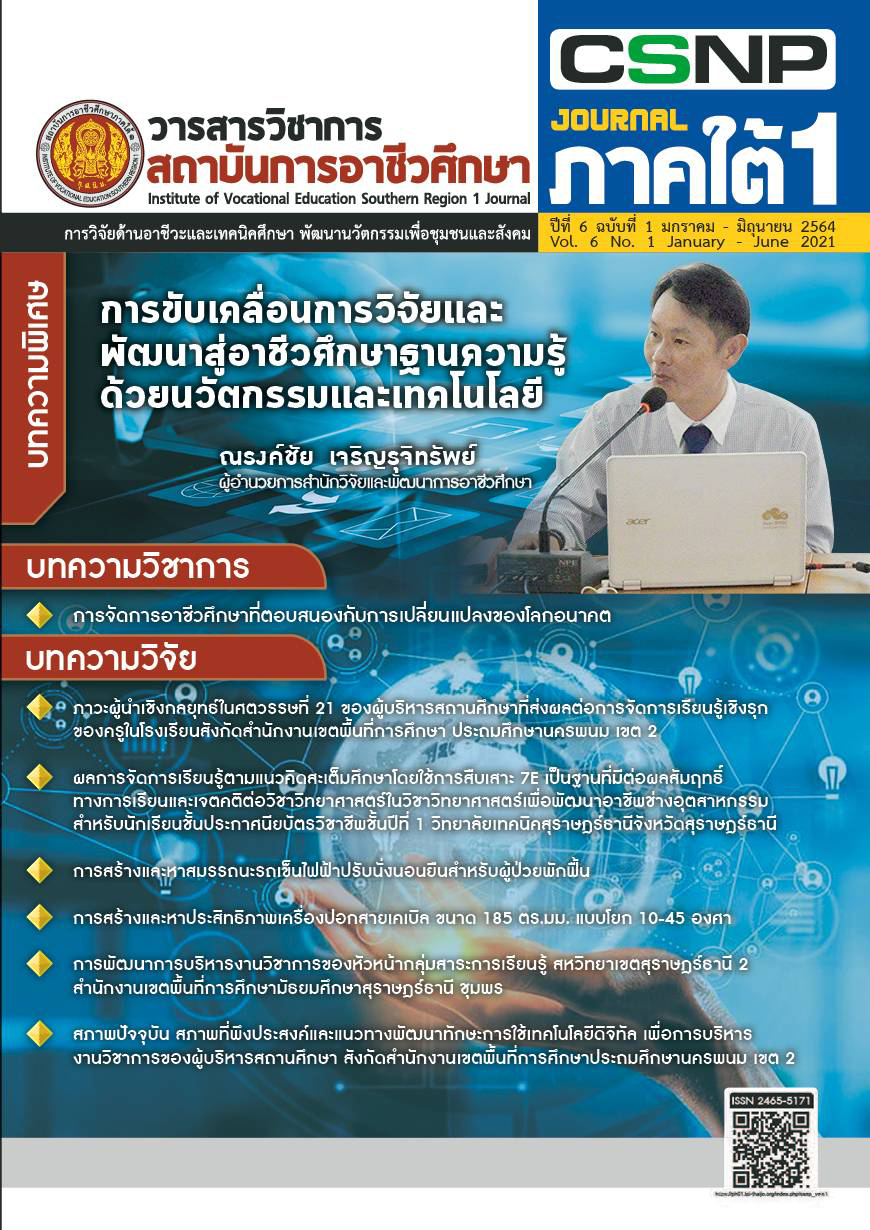ผลการจัดการเรียนรู้ตามแนวคิดสะเต็มศึกษาโดยใช้การสืบเสาะ 7E เป็นฐานที่มีต่อผลสัมฤทธิ์ทางการเรียนและเจตคติต่อวิชาวิทยาศาสตร์ในวิชาวิทยาศาสตร์เพื่อพัฒนาอาชีพช่างอุตสาหกรรม สำหรับนักเรียนชั้นประกาศนียบัตรวิชาชีพชั้นปีที่ 1 วิทยาลัยเทคนิคสุราษฎร์ธานี จังหวัดสุราษฎร์ธานี
คำสำคัญ:
สะเต็มศึกษา, การสืบเสาะ 7E, ผลสัมฤทธิ์ทางการเรียนวิชาวิทยาศาสตร์เพื่อพัฒนาอาชีพช่าง, อุตสาหกรรม, เจตคติต่อวิชาวิทยาศาสตร์บทคัดย่อ
การวิจัยครั้งนี้ มีวัตถุประสงค์เพื่อ 1) เปรียบเทียบผลสัมฤทธิ์ทางการเรียนวิชาวิทยาศาสตร์เพื่อพัฒนาอาชีพช่างอุตสาหกรรมของนักเรียนชั้นประกาศนียบัตรวิชาชีพชั้นปีที่ 1 ระหว่างการจัดการเรียนรู้ตามแนวคิดสะเต็มศึกษาโดยใช้การสืบเสาะ 7E เป็นฐานกับการจัดการเรียนรู้แบบปกติ 2) เปรียบเทียบเจตคติต่อวิชาวิทยาศาสตร์ของนักเรียนชั้นประกาศนียบัตรวิชาชีพชั้นปีที่ 1 ระหว่างการจัดการเรียนรู้ตามแนวคิดสะเต็มศึกษาโดยใช้การสืบเสาะ 7E เป็นฐานกับการจัดการเรียนรู้แบบปกติ กลุ่มตัวอย่างเป็นนักเรียนระดับ ประกาศนียบัตรวิชาชีพปีที่ 1 สาขางานยานยนต์ วิทยาลัยเทคนิคสุราษฎร์ธานี ในภาคเรียนที่ 2 ปีการศึกษา 2562 จังหวัดสุราษฎร์ธานี จำนวน 60 คน ได้มาโดยการสุ่มแบบกลุ่ม (Cluster Random Sampling) และจับสลากเป็นกลุ่มทดลองและกลุ่มควบคุม เครื่องมือที่ใช้ในการทดลอง ได้แก่ แผนการจัดการเรียนรู้รายวิชาวิทยาศาสตร์เพื่อพัฒนาอาชีพช่างอุตสาหกรรม ตามแนวคิดสะเต็มศึกษาโดยใช้การสืบเสาะ 7E เป็นฐาน เรื่อง สมดุลวัตถุ การเคลื่อนที่แนวเส้นตรง งานพลังงาน และแผนการจัดการเรียนรู้แบบปกติ เครื่องมือในการรวบรวมข้อมูล ได้แก่ แบบทดสอบวัดผลสัมฤทธิ์ทางการเรียนรายวิชาวิทยาศาสตร์เพื่อพัฒนาอาชีพช่างอุตสาหกรรม และแบบวัดเจตคติต่อวิชาวิทยาศาสตร์ สถิติที่ใช้ในการวิเคราะห์ข้อมูล คือ ค่าเฉลี่ย ส่วนเบี่ยงเบนมาตรฐาน และการทดสอบค่าที (t-test) แบบ Independent
ผลการวิจัยปรากฏว่า 1) ผลสัมฤทธิ์ทางการเรียนหลังเรียนรายวิชาวิทยาศาสตร์เพื่อพัฒนาอาชีพช่างอุตสาหกรรมของนักเรียนระดับประกาศนียบัตรวิชาชีพชั้นปีที่ 1 วิทยาลัยเทคนิคสุราษฎร์ธานี จังหวัดสุราษฎร์ธานี ที่เรียนโดยวิธีการจัดการเรียนรู้ตามแนวคิดสะเต็มศึกษา โดยใช้การสืบเสาะ 7E เป็นฐาน สูงกว่าผลสัมฤทธิ์ทางการเรียนของนักเรียนที่เรียนโดยวิธีการจัดการเรียนรู้แบบปกติอย่างมีนัยสำคัญทางสถิติที่ระดับ .05 และ2) เจตคติต่อวิชาวิทยาศาสตร์ หลังเรียนของนักเรียนระดับประกาศนียบัตรวิชาชีพชั้นปีที่ 1 วิทยาลัยเทคนิคสุราษฎร์ธานี จังหวัดสุราษฏร์ธานี ที่เรียนโดยวิธีการจัดการเรียนรู้ตามแนวคิดสะเต็มศึกษาโดยใช้การสืบเสาะ7E เป็นฐาน สูงกว่าเจตคติต่อวิชาวิทยาศาสตร์ของนักเรียนที่เรียนโดยวิธีการจัดการเรียนรู้แบบปกติอย่างมีนัยสำคัญทางสถิติที่ระดับ .05
เอกสารอ้างอิง
Barman, C. R. and Kotar M. (1989). The Learning Cycle. Science and Children. Science and Children, Vol. 26 No. 7 April 1989, 30-32.
Eisenkraft, A. (2003). Expanding the 5E Model. Science Teacher, Vol. 70 No. 6 September 2003, 57-59.
ปุญญพัฒน์ โคตรบุตร. (2560). การบูรณาการตามแนวคิดสะเต็มศึกษาในการเสริมสร้างผลสัมฤทธิ์ทางการเรียนและเจตคติต่อวิชาวิทยาศาสตร์ สำหรับนักเรียนชั้นมัธยมศึกษาปีที่ 1. วิทยานิพนธ์ ปริญญาครุศาสตรมหาบัณฑิต สาขาวิชาวิทยาศาสตรศึกษา มหาวิทยาลัยราชภัฏมหาสารคาม, มหาสารคาม.
นัสรินทร์ บือซา. (2558). ผลการจัดการเรียนรู้ตามแนวคิดสะเต็มศึกษา (STEM Education) ที่มีต่อผลสัมฤทธิ์ทางการเรียนชีววิทยา ความสามารถในการแก้ปัญหาและความพึงพอใจต่อการจัดการเรียนรู้ของนักเรียนชั้นมัธยมศึกษาปีที่ 5. วิทยานิพนธ์ ปริญญาศึกษาศาสตรมหาบัณฑิต สาขาวิชาการสอนวิทยาศาสตร์และคณิตศาสตร์ มหาวิทยาลัยสงขลานครินทร์, ปัตตานี.
อับดุลยามีน หะยีขาเดร์. (2560). ผลของการจัดการเรียนรู้ตามแนวทางสะเต็มศึกษาที่มีต่อผลสัมฤทธิ์ทางการเรียนชีววิทยา ความคิดสร้างสรรค์ทางวิทยาศาสตร์ และความพึงพอใจต่อการจัดการเรียนรู้ของนักเรียนชั้น มัธยมศึกษาปีที่ 5. วิทยานิพนธ์ ปริญญาศึกษาศาสตรมหาบัณฑิต สาขาวิชาการสอนวิทยาศาสตร์และคณิตศาสตร์ มหาวิทยาลัยสงขลานครินทร์, ปัตตานี.
บังอร ดำด้วงโรม. (2562). การศึกษาผลสัมฤทธิ์ทางการเรียนและทักษะกระบวนการทางวิทยาศาสตร์ของนักเรียนชั้นประกาศนียบัตรวิชาชีพ (ปวช.) ชั้นปีที่ ๒ ในรายวิชาวิทยาศาสตร์ช่างอุตสาหกรรมที่ได้รับการจัดการเรียนรู้แบบสะเต็มศึกษากับการจัดการเรียนรู้ปกติ. วิจัยชั้นเรียน ปีการศึกษา 2562 วิทยาลัยเทคนิคสุราษฎร์ธานี.
จำรัส อินทลาภาพร มารุต พัฒผล วิชัย วงษ์ใหญ่ และศรีสมร พุ่มสะอาด. (2558). การศึกษาแนวทางการจัดการเรียนรู้ตามแนวสะเต็มศึกษาสำหรับผู้เรียนระดับประถมศึกษา. วารสาร Veridian E-Journal, Silpakorn University สาขามนุษยศาสตร์ สังคมศาสตร์ และศิลปะ, ปีที่ 8 ฉบับที่ 1 มกราคม-เมษายน 2558, 62-74.
อชิรวัตติ์ ตั้งสมบัติสันติ. (2560). ผลการจัดการผลการจัดการเรียนรู้ตามแนวคิดสะเต็มศึกษา ในรายวิชาฟิสิกส์ ระดับชั้นมัธยมศึกษาปีที่ 5 เรื่องแสงและทัศนูปกรณ์. วิทยานิพนธ์ ปริญญาครุศาสตรมหาบัณฑิต สาขาวิชาวิทยาศาสตรศึกษา มหาวิทยาลัยราชภัฏมหาสารคาม, มหาสารคาม.



